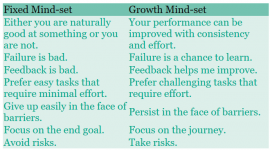How to Change Your Life in 5 Seconds
Counting backward from five (5-4-3-2-1) forces your brain to stop, focus, and occupy itself with something else. Your brain's no longer being hijacked by fear, doubt, anger, or any other powerful emotion that can lead to bad, knee-jerk decisions.
It also stimulates the prefrontal cortex, the part of the brain that's active when you're changing behavior, when you're learning something new, or when you're directing your thoughts.
"So instead of letting your brain sabotage you, you're using a meta-cognition technique to switch the gears in our mind and make changing easy," Robbins said.
Counting backward from five (5-4-3-2-1) forces your brain to stop, focus, and occupy itself with something else. Your brain's no longer being hijacked by fear, doubt, anger, or any other powerful emotion that can lead to bad, knee-jerk decisions.
It also stimulates the prefrontal cortex, the part of the brain that's active when you're changing behavior, when you're learning something new, or when you're directing your thoughts.
"So instead of letting your brain sabotage you, you're using a meta-cognition technique to switch the gears in our mind and make changing easy," Robbins said.



